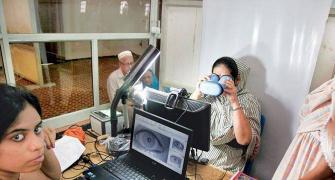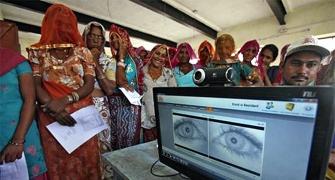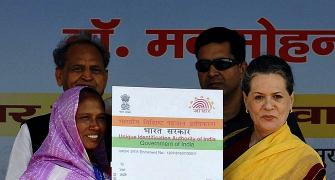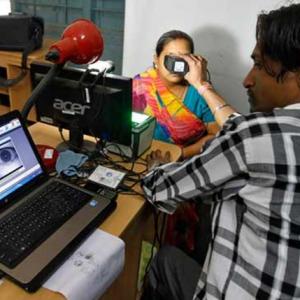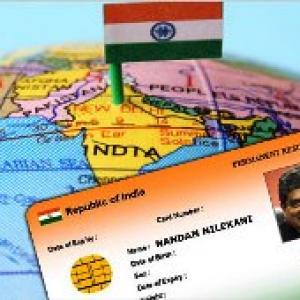 There are unprecedented political implications of identification based on 'biological attributes of an individual,' such as employed by Aadhaar, warns Gopal Krishna.
There are unprecedented political implications of identification based on 'biological attributes of an individual,' such as employed by Aadhaar, warns Gopal Krishna.
On April 20, an order was issued by a court in Norway in the case involving Anders Behring Breivik, who has been found guilty of killing eight people in Oslo and 69 at Utøya on July 22, 2011. In August 2012 he was sentenced to 21 years preventive detention for mass murder, causing a fatal explosion, and terrorism.
Breivik is serving the sentence under a regime of particularly high security at the Telemark prison in Skien, Norway. His motive for his terrorist acts was to market his manifesto '2083: A European Declaration of Independence.' The court ruled that the Norwegian government had violated his human rights and that keeping him in long-term solitary confinement could affect his mental health.
Brevik's case reminds one of the words used in his 1,518 pages-long manifesto or compendium of texts.
It is noteworthy that Brevik's manifesto makes repeated reference to 'identification,' to the word 'identity' over 100 times, to 'unique' over 40 times and to 'identification' over 10 times. There are references to 'state-issued identity cards', 'converts' identity cards', 'identification card', 'fingerprints', 'DNA' etc.
Breivik's obsession with 'identification' mirrors that of the promoters of 12 digit biometric unique identity (UID)/Aadhaar number. The fixation with identification based on 'biological attributes of an individual' provided under the Aadhaar Act 2016 has unprecedented political implications.
This Act empowers the Unique Identification Authority of India to promote 'research and development for advancement in biometrics and related areas,' as if the citizens of India are guinea pigs.
Brevik's European manifesto finds resonance in the unique identification (UID)/Aadhaar number exercise for Central Identities Data Repository, an 'online database' which can be Wikileaked. A careful perusal of UIDAI documents reveals that it is linked to the electoral database too.
This came to light from a 14-page long document titled 'Strategic Vision: Unique Identification of Residents' prepared by Wipro Ltd and submitted to the processes committee of the Planning Commission which was set up in July 2006.
Its vision statement reads: 'Creating a unique identification system of all residents in the country for efficient, transparent, reliable and effective delivery of various welfare and private services to the common person.' The cover page of the document mentions the National Institute for Smart Government, department of information technology, and Wipro Consulting.
Admittedly, Wipro was the consultant for the design phase and programme management phase of the pilot UIDAI project. The Hyderabad-based NISG is a not-for-profit company incorporated in 2002 by the Government of India and Nasscom. NISG aims to 'establish itself as an institution of excellence in e-governance and to leverage private sector resources through a public-private-partnership mode in establishing eIndia.'
Another 15-page Wipro document, titled 'Does India need a Unique Identity Number?', cited the example of the United Kingdom's Identity Cards Act, 2006, on page number 6 to advance the argument for a biometric UID/Aadhaar number in India.
But when the UK government stopped its National Identity Cards Scheme, neither Wipro nor its donors in the government examined as to why the UK did so and why this decision too is relevant to India. The decision was announced in the British parliament, the same legislature which passed the India Independence Act, 1947.
A document titled 'Homeland security in India' underlines the connection between the UID number and the National Intelligence Grid (NatGrid). This document has been prepared by the Associated Chambers of Commerce and Industry of India which has a membership of over 300,000 companies, and KPMG, a transnational firm that operates in 140 countries which is affiliated to KPMG International, a Swiss agency.
Captain Raghu Raman, who became the NatGrid chief during the previous government, has advanced the argument for the handing over of the country's 'internal security' to the 'commercial czars' and recommended 'private territorial armies' to safeguard 'corporate empires' as per his paper titled 'A Nation of Numb People.'
Captain Raman has been chairman of the Internal Security Committee, Bombay Chamber of Commerce & Industry. He has been head of the subgroup on industry guidelines. He is a member of the national task force on internal security, the Confederation of Indian Industry. He has been a member of the London Speakers Bureau and CEO of Mahindra Special Services Group, a leading corporate security risk consulting firm.
On March 10, 2015, the ministry of home affairs informed the Lok Sabha that 'NatGrid and the Unique Identification Authority of India have not been declared as intelligence agencies.' It is evident that this reply is cleverly worded.
The fact is that both are interlinked.
The fact is that the name NatGrid itself reveals that it is functioning as part of the intelligence agencies. When the media asked the UIDAI chief about its link with intelligence agencies, he responded with 'No comments.'
As per the Cabinet Secretariat website, the 'functions' of the Cabinet Committee on UIDAI related issues included 'all issues relating to the Unique Identification Authority of India including its organisation, plans, policies, programmes, schemes, funding and methodology to be adopted for achieving the objectives of that authority.' This committee that supervised the Authority has now been disbanded.
The nature of UIDAI is revealed in clause 48 of the Aadhaar Act which provides the 'Power of central government to supersede Authority.'
It reads: 'If, at any time, the central government is of the opinion -- (a) that, on account of circumstances beyond the control of the Authority, it is unable to discharge the functions or perform the duties imposed on it by or under the provisions of this Act; or (b) that the Authority has persistently defaulted in complying with any direction given by the central government under this Act or in the discharge of the functions or performance of the duties imposed on it by or under the provisions of this Act and as a result of such default the financial position of the Authority or the administration of the Authority has suffered; or (c) that a public emergency exists, the central government may, by notification, supersede the authority for such period, not exceeding six months, as may be specified in the notification and appoint a person or persons as the President may direct to exercise powers and discharge functions under this Act.'
It appears that in order to mask its true motive the central government shifted the UID project from the department of information technology renamed the department of electronics and information technology (now called the department of electronics and information technology) under the Union ministry of communications and information technology, to the Planning Commission.
Not surprisingly, after the dismantling of the commission, the UID project and UIDAI have again been relocated under the department of electronics and information technology.
Notably, this department was responsible for the home ministry's biometric profiling National Population Register as well.
It is relevant to examine the reasons for the advocacy of NatGrid by Colonel Richard Kemp who has served in the British army from 1977 to 2006 and who was chairman of British forces in Afghanistan and worked for the Joint Intelligence Committee around the globe.
In an article in The Times of India dated July 26, 2011, he stated that 'one of the greatest failings in British intelligence that allowed the July 2005 attacks to succeed was inadequate IT' and blames 'bureaucratic paralysis' in India that has stalled the implementation of the National Intelligence Grid (that) needs to be unlocked -- and fast.'
Such touching faith in IT is misplaced. The late Roger Needham, a British computer scientist, said, 'If you think IT is the solution to your problem, then you don't understand IT, and you don't understand your problem either.'
Given the fact that Indian intelligence organisations are not accountable to Parliament, the Intelligence Services (Powers and Regulation) Bill, 2011 has been introduced as a private member's bill.
Nandan Manohar Nilekani refers to Hernando de Sotto's failed idea and book The Mystery of Capital: Why Capitalism Triumphs in the West and Fails Everywhere Else published in 2003, through his own book Imagining India, and argued that the national ID system would be a big step for land markets to facilitate right to property and undoing of the abolition of right to property in 1978 in order to bring down poverty!
Notably, in the Draft Land Titling Bill too there was a reference to the Unique Property Identification Number. It appears that the real motive of the UID Number is being hidden.
Is it a coincidence that Nilekani pushed the UID/Aadhaar idea as head of the technology advisory group on unique projects that proposes a 'private company with public purpose' and with 'profit making as the motive but not profit maximising'?
Is it a coincidence that as head of the inter-ministerial task force to streamline the subsidy distribution mechanism and as head of the Government of India's IT task force for power sector he did the same?
At a recently concluded meeting of the All India Peoples' Forum, a political entity, there was a demand made that governmental and non-governmental intelligence agencies must be brought under democratic control. Such demands are relevant for dealing with private commercial czars entering the government to subvert existing public institutions.
Biometric identification makes citizens naked and powerless. Stieg Larsson, a Swedish journalist and writer best known for writing the Millennium trilogy of crime novels, could not marry his partner Eva Gabrielsson, a Swedish architect, author, political activist, feminist because under Swedish law, couples entering into marriage have to make their addresses public and its disclosure posed a security risk as he was reporting on extremist groups and faced death threats from them.
The couple masked their addresses, personal data and identity numbers from public records because in the absence of kind of such 'identity cover' he could not have worked as a journalist.
A visiting Swedish researcher student revealed that in Sweden, the citizens are biometrically profiled using DNA samples in the name of disease surveillance.
Notably, such regressive policies have been outlawed by the European Court of Human Rights.
In a unanimous decision on the violation of the right to privacy and family life by biometric profile retention in criminal justice databanks, 17 judges found that the 'blanket and indiscriminate nature' of the power of retention of fingerprints, cellular samples, and DNA profiles of persons suspected but not convicted of offenses, failed to strike a fair balance between competing public and private interests and ruled that the United Kingdom had 'overstepped any acceptable margin of appreciation' in this regard.
The Hyderabad-based Centre for DNA Fingerprinting and Diagnostics in India plans to conduct 'human population analysis with a view to eliciting signature profiling of different caste populations of India to use them in forensic DNA fingerprinting and develop DNA databases.'
On the CDFD website, there is an identification form for DNA sample tests. This form has an entry column for filling 'caste and origin of state' information. This appears to be dictated by genetic determination akin to eugenics.
It is noteworthy that Indian public institutions are modelled on European institutions. In such a situation, the ECHR decision is quite relevant for biometric UID/Aadhaar, the proposed Human DNA Profiling Bill, and voice print through Radio Frequency Identification being planted in vehicles and libraries in India wherein political extremists have adopted a written and unwritten manifesto similar to that of Breivik, the neo-Crusader.
The political class in general and the genuine opposition forces in particular are yet to provide a robust political response to the unfolding regime which is subjugating citizenry using indiscriminate biometric profiling and welfare schemes as fish bait.
Photograph: Kind courtesy, Wikimedia Commons

